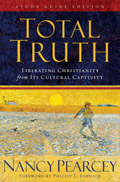
Nancy Pearcey
Reviewed by: D. G. Hart
Total Truth: Liberating Christianity from Its Cultural Captivity, by Nancy Pearcey. Published by Crossway .Books, 2004. Hardback, 479 pp., list price $25.00. Reviewed by D. G. Hart.
Abraham Kuyper gave forceful expression to the importance of a Christian world-and-life view. After the fundamentalist controversy of the 1920s, the idea of a Christian worldview lost its appeal, mainly because evangelicals tended to stress soul-winning over responsibilities in the world. But since 1970, worldview thinking has regained popularity. This new book by Nancy Pearcey, the Francis A. Schaeffer Scholar at the World Journalism Institute, is an indication of the influence that Kuyper still has.
Pearcey argues that Christianity is a system of truth rather than a collection of diverse truths. The problem, as she understands it, is that most evangelicals live with a mental dichotomy between the truths they profess on Sunday and the ideas that inform and guide their lives during the week. To overcome this compartmentalization, Pearcey recommends the three-part scheme of creation, fall, and redemption. This grid can be applied to any area of human life, thereby showing that Christianity is practical for the whole range of human affairs. Every system of thought, from quantum mechanics to liberal democracy, begins with "some ultimate principle" (p. 41). If Christians cannot detect and critique the non-Christian ideas that shape so much of contemporary society, they will unthinkingly end up bowing to the "intellectual idols" of secular culture, rather than constructing "biblically based alternatives" (p. 42).
On the whole, Pearcey's book has much to commend it, though at times it reads like three titles rather than one (one section on worldview, one on science, and one on the history of evangelicalism). Still, her critique of dualistic thinking does not adequately address the profound ways in which Scripture and Reformed theology affirm a measure of dualism as essential to Christian faith and practice. For instance, in his instruction to the Corinthians, Paul distinguishes sharply between the gospel and the wisdom of the world. Just as the wisdom of the world will not lead to a saving knowledge of Christ, neither will the gospel in itself yield the wisdom of a Plato or an Aristotle. This is because the gospel addresses something deeper than the true, the good, and the beautiful. The rejection of this dualism makes no room for appropriate distinctions between things that are explicitly religious (the holy) and those that are only implicitly so (the common), such as the one between the Sabbath and the other days of the week.
By making this mistake, Pearcey may be blind to the very problem of worldview thinking. In her subtitle, she indicates that her desire is to liberate the faith from its cultural captivity. By showing the relevance of Christianity as a system of total truth, Pearcey hopes to let the gospel out of the cage of religion to let it roam across all walks of life. Accordingly, she tries to make the Bible relevant to developments in the arts, science, politics, and education for starters. But this lets the cultural and social arenas set the agenda for Christian reflection. Yet the increasing popularity of Christian world-and-life view thinking, means that more Christians are likely to consider the importance of Christianity for politics than they are for corporate worship.
It should be possible to have both a Christian world-and-life view and a Reformed outlook on the church, her ministry, and worship. It would help if the proponents of a Christian worldview were as concerned about the church and her internal life as they are about the culture that Christians need to transform.
February 01, 2026
January 25, 2026
January 18, 2026
January 11, 2026
Texts that Transform: Church and Ministry
January 04, 2026
December 28, 2025
December 21, 2025
© 2026 The Orthodox Presbyterian Church